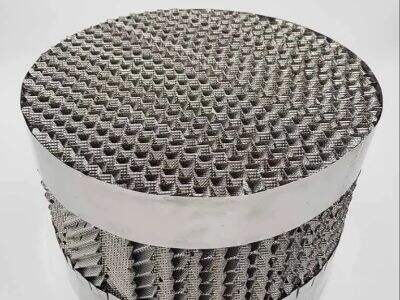Refineries are an essential part of our modern lifestyles; they process crude oil arriving from a variety of foreign and domestic sources into useful products such as gasoline, diesel, and jet fuel. The energy cost associated with this process, and the pollutants released into atmosphere are quite high. And here is where structured packings are able to step up to assist refineries in minimising their energy use and cutting down on emissions, further nurturing more sustainable operations.
Structured Packings for Enhanced Refinery Efficiency
A distillation column is a crucial equipment used in refineries, and the structured packings are just one type of internal tower packing material. The design of these Sutong China structured packings is such that it offers a large surface area for the liquid and vapor to be in contact with one another this would help us to separate various components in the crude oil more efficiently. The improved activity also allows for refineries to be operated at lower temperatures and pressures, which in turn lowers the energy demand of said processes and can reduce overall carbon emissions.
Reduced energy consumption and emissions in refineries implemented with structured packings
Random packing and trays are the traditional type of packing material, but they have been existent in refineries more than fifty years ago, hence less efficient as compared to structured packings. The structured packings are a way to achieve safer, higher-performance refineries that use less energy and emit fewer emissions. This is mainly due to their superior heat transfer performance, leading to better heat exchange between the hot vapors and cold liquid inside the column.
As well as reduced energy use, structured packings can also lower emissions by delivering better separation between various components in the crude oil. This leads to the lower release of harmful gases and a cleaner and healthier atmosphere for all of us. Thanks to structured packings, refineries can process the required amount while complying with ever stricter environmental regulations.
The industrial revolution of structured packings in refineries
Indeed, structured packings are changing the game for refineries, serving as a cleaner and greener solution to better separate crude oil into its many elements. Structured packings provide those same benefits, but at a much lower cost in energy and by leveling off production and efficiencies for refineries.
Structured packings offer one unrivaled advantage — the ability to deal with such a broad scope of operating conditions that they can be deployed in virtually every type of refining process. The structured packing are designed to operate at high-temperature or low-pressure and provides reliable performance. Refineries are much more effective by feeding in 336 tons of gypsum (like the USGS case study) to a flexible reactor than one that is cut rigidly with refractory and fire brick, because it keeps calling for outages at longer intervals so turning around faster between the kilns.
Lifecycle sustainability of operations with structured packings in refineries
At the present time, refineries are as important to be made sustainable as any other thing. Refineries that utilize structured packings in their distillation columns can operate efficiently and economically while remaining sustainable. In addition to being important for the future of our planet, structured packings are also a necessary refining tool for anyone in a refinery business looking to remain competitive.
How to minimize energy usage and environmental footprint in refineries?
Structured packings also allow refineries to enhance their product quality and uniformity so they can provide the best results available. This has the potential to boost customer satisfaction and loyalty as more consumers are seeking out eco- friendly, sustainable products. With structured packings, refineries can compete while also establishing themselves as industry leaders in sustainability and emissions.
Table of Contents
- Structured Packings for Enhanced Refinery Efficiency
- Reduced energy consumption and emissions in refineries implemented with structured packings
- The industrial revolution of structured packings in refineries
- Lifecycle sustainability of operations with structured packings in refineries
- How to minimize energy usage and environmental footprint in refineries?


 EN
EN
 AR
AR
 NL
NL
 FI
FI
 FR
FR
 DE
DE
 IT
IT
 KO
KO
 JA
JA
 PL
PL
 RU
RU
 ES
ES
 TL
TL
 UK
UK
 TR
TR
 TH
TH
 MS
MS
 BE
BE
 LO
LO
 EO
EO
 FA
FA
 VI
VI
 LT
LT
 IW
IW
 EL
EL
 CS
CS
 RO
RO
 PT
PT
 NO
NO
 HI
HI
 DA
DA
 HR
HR
 BG
BG
 ID
ID
 SR
SR
 SL
SL
 SK
SK
 HU
HU
 GL
GL
 GA
GA

